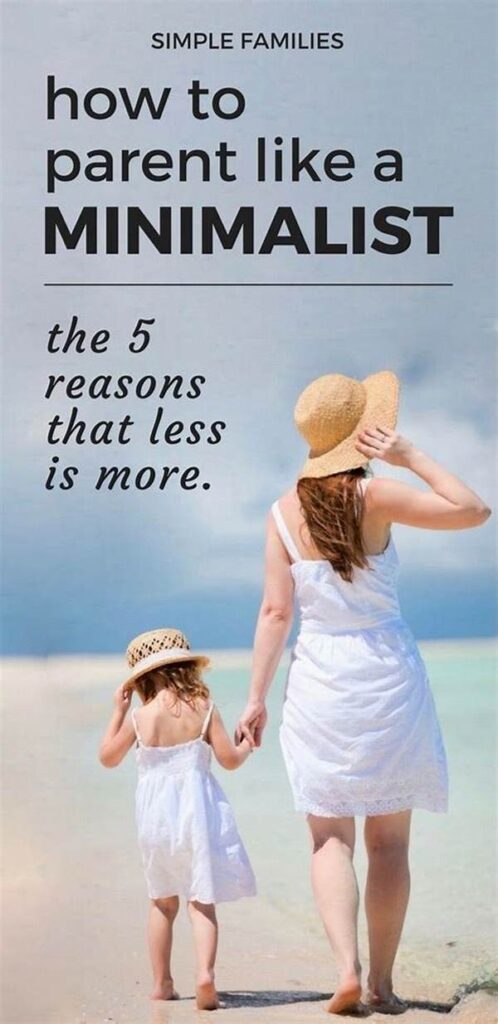I’m here to help you craft a comprehensive article on “how minimalist parenting simplifies family life.” Given your request, I’ll provide various elements to ensure your content is engaging, informative, and tailored to your needs. Let’s get started.
Read More : How To Embrace Minimalism Without Sacrifice
—
In the hustle and bustle of modern parenting, the pressure to juggle work, school, extracurricular activities, and family commitments can sometimes feel overwhelming. But what if there was a way to streamline these demands and foster a more meaningful connection within your family? Enter minimalist parenting, a philosophy that encourages parents to simplify their approach and focus on quality over quantity. Minimalist parenting is not about depriving children of experiences or material goods, but about re-evaluating what truly matters. It’s about teaching children to value relationships, experiences, and emotions over possessions. This approach has been gaining traction among families seeking a more intentional and fulfilling lifestyle, and it’s no wonder why — it offers a path to decreased stress, increased satisfaction, and more meaningful family interactions.
Minimalist parenting stands out as a unique approach in the crowded world of parenting philosophies. While it may initially sound like a trend encouraging parents to discard toys and avoid scheduling kids for activities, it goes much deeper. It’s about instilling values that encourage emotional intelligence and resilience by reducing dependence on material things and over-scheduled lives. Parents who embrace this philosophy often find more time and energy to spend on meaningful family activities and bonding. As such, the big selling points of minimalist parenting are its ability to reduce stress and create space for genuine family connection, which many parents find to be the holy grail of modern family life.
Embracing Minimalism for Family Harmony
The concept of minimalist parenting might first seem like a challenging adjustment, especially for families used to the fast-paced, busy lifestyle. However, the transition typically unfolds naturally once the intention is set. Parents begin to notice that their children play more creatively and cooperatively with fewer toys. There’s less need to keep up with Joneses, and more appreciation for downtime, which becomes a valuable family commodity. Studies have shown that children who grow up in less cluttered, highly engaged family environments tend to develop better focus and interpersonal skills. This not only fosters family harmony but also contributes to healthier emotional development in children.
Adopting minimalist parenting doesn’t mean a complete makeover of your lifestyle overnight. Start small by decluttering spaces one area at a time and focus on family bonding activities rather than material rewards. You’ll find that how minimalist parenting simplifies family life isn’t just a catchphrase; it’s a transformative approach to family dynamics. By allowing space for what’s truly important, families can enjoy a deeper sense of connection, reduced anxiety, and increased joy.
—
Exploring the Impact: Benefits of Minimalist Parenting
In examining the benefits of minimalist parenting, one might question whether this approach fits every household. While every family is unique, empirical evidence suggests that introducing minimalist principles into family life often results in positive changes. Parents report feeling less overwhelmed by daily demands, and children tend to interact more meaningfully without an overload of toys or scheduled activities. The primary goal here is to create an environment conducive to focus and interaction.
How Minimalist Parenting Simplifies Family Life
Families that practice minimalist parenting often find a continuous flow of positive outcomes. The reduced emphasis on material possessions and scheduled activities leads to more quality time for families to spend together, thus fostering connections that might otherwise be lost in the chaos of everyday life. Parents find themselves with more time to engage in educational activities with their children or to simply enjoy unstructured play that strengthens familial bonds.
The concept that “less is more” rings true in these households. Decluttering physical spaces can also clear mental clutter, allowing family members to engage more deeply with each other. Simple practices such as family dinners, game nights, or walks in the park become focal points for enjoyment and connection without the stress of keeping up appearances or schedules.
Creating Space for Authentic Relationships
One of the most appealing aspects of minimalist parenting is the space it creates for authentic relationships. By focusing on what truly matters, parents and children can cultivate more profound bonds through shared experiences. The lack of distractions allows for deeper conversations, fostering understanding and empathy both ways. Parents who adhere to minimalist principles often find that these values are instilled in their children, leading to a more harmonious and well-rounded family life.
While skepticisms around minimalist parenting persist—some critics argue it may limit children’s exposure to varied experiences—the core idea revolves around intentionality rather than limitations. By choosing meaningful interactions over material possessions, families can navigate life with a clearer purpose and shared sense of values. Ultimately, how minimalist parenting simplifies family life is through these intentional choices that bring families closer together and enrich their lives.
—
Topics Related to Minimalist Parenting
Minimalist parenting offers an intriguing path to achieve simpler, more meaningful family dynamics in today’s fast-paced world. Embracing this philosophy could be the key to unlocking a more connected, stress-free family environment that values authenticity and relationship-building. The essence lies not in restricting experiences but in choosing the right ones, creating a lasting impact on family relationships.


